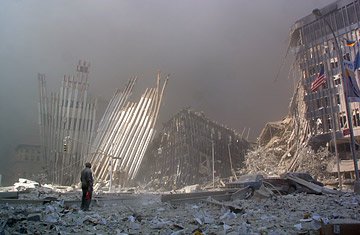
A man stands in the rubble, and calls out asking if anyone needs help, after the collapse of the first World Trade Center Tower in New York City on September 11, 2001.
(5 of 10)
In the midst of his own grief, Clifford found the number of Maffeo's boss and called to say she was alive but in very bad shape. Her boss then contacted the family, who eventually found her in critical condition at New York-Presbyterian Hospital, burned over so much of her body that the doctors required the family to put on scrubs before seeing her. When they were finally reunited, Maffeo insisted that they track down the man who saved her.
Consoling his brother-in-law in Connecticut and his family back in Ireland, Clifford received a phone call from Maffeo's sister. Clifford told her about his own losses in the crash. The sister gave Clifford the family's thanks for putting himself at risk to be her sister's savior. Clifford replied that she had it wrong--he never would have made it out of the building before it collapsed if he had not picked up her sister. "The truth is, she saved my life, she gave me strength," says Clifford. He also believes his sister Ruth's hovering spirit pointed his way out of the carnage. --By Jodie Morse. Reported by Alice Park
The Last Phone Call
High in the air, from inside the planes and skyscrapers where their final moments slipped away, dozens of victims spoke their last words to faraway people closest to their hearts. Some updated their mothers on developments, like seasoned correspondents calling in reports. A few asked husbands for advice, making vague, impossible requests. But almost all the calls, in the end, turned into love letters.
"Hey, Jules. It's Brian. I'm on a plane that's been hijacked. It doesn't look good. I just want to tell you how much I love you." As United Flight 175 hurtled toward Manhattan, Brian Sweeney, 38, managed to tick off all the important points for his wife Julie in a message on their Cape Cod, Mass., answering machine. "I hope that I call you again. But if not, I want you to have fun. I want you to live your life. I know I'll see you someday." Eight minutes later, after Sweeney made the extemporaneous speech of his life, his plane crashed into the World Trade Center's south tower.
In the age of television, Americans were treated to graphic scenes of soldiers dying. In the age of mobile phones, we can now say goodbye to the casualties before they die. It is a haunting privilege, a glimpse into the mind-set of the doomed. Just like the images, the voices tell us more and less than we want to know.
Julie Sweeney has listened to her husband's message only once. She is trying to resist playing it over and over. "I want to keep listening to it, I want to hear his voice, but I don't know if that's a healthy thing to do." She is glad he called, because "hearing his calm voice, hearing his love for me, was helpful." But it also saddened her, she says, making her feel like a witness to her husband's murder.
The voices do not comfort us with the illusion that these victims died instantly, ignorant of their fate. Quite the contrary. They give us a script to run through in our minds. The victims moved past denial into acceptance at breakneck speed, which meant they understood clearly--more clearly than we--what was happening. Perhaps that's why the hijackers, as some reports have suggested, urged some passengers to call home--quite aware that the drama would inflame our despair.
